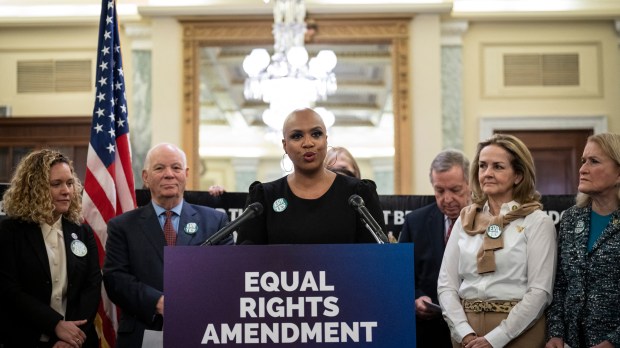The U.S. Senate Judiciary Committee on February 28 discussed the Equal Rights Amendment, a proposal that was first introduced a century ago but has failed to attain ratification.
The ERA would guarantee that “equality of rights under the law shall not be denied or abridged by the United States or by any State on account of sex.” Though that language seems like it would assure that women are treated equally, serious concerns about the amendment’s impact still exist. The United States Conference of Catholic Bishops and others have warned that the amendment could ensure that the legality of abortion is enshrined in the U.S. Constitution.
One consequence of ratifying the ERA “would be the likely requirement of federal funding for abortions,” said a March 12, 2021, letter to members of congress from the bishops’ conference.
The letter pointed out that by that date, at least two states had construed their own equal rights amendments, with language analogous to that of the federal ERA, to require government funding of abortion.
“Both supporters and opponents of abortion believe that the federal ERA would have this effect, as well as restrain the ability of federal and state governments to enact other measures regulating abortion, such as third-trimester or partial birth abortion bans, parental consent, informed consent, conscience-related exemptions, and other provisions,” the bishops wrote. “While in the early years of the ERA debate some considered these abortion threats to be remote or ‘scare tactics,’ abortion advocates in recent years have freely admitted that they intend to use the ERA to litigate such abortion claims and anticipate that such cases would be successful. Many pro-ERA campaigns and organizations claim that codifying Roe v. Wade (and going further than Roe) is one of the purposes of the ERA and is exactly what is intended by ‘equality’ for women.”
A separate fact sheet on the USCCB website noted that a 2019 NARAL Pro-Choice America email said that with its ratification, the ERA would “reinforce the constitutional right to abortion by clarifying that the sexes have equal rights, which would require judges to strike down anti-abortion laws because they violate both the constitutional right to privacy and sexual equality.”
Not abortion-neutral
Marjorie Dannenfelser, president of Susan B. Anthony Pro-Life America, said in a statement Tuesday that “Democrats’ push to rewrite the rules to install the ERA is about enshrining abortion on demand until birth in the U.S. Constitution – the opposite of equal rights.
“During past attempts, abortion advocates repeatedly rejected language to make the ERA abortion neutral,” Dannenfelser said. “Ever since it became clear that the Supreme Court might finally restore the right to protect unborn children to the people, they explicitly argue the ERA is necessary to block pro-life laws that could otherwise save more than 125,000 lives in the first year after Dobbs alone.”
She was referring to Dobbs v. Jackson, the 2022 Supreme Court decision overturning Roe v. Wade.
Emma Waters, a research associate with the DeVos Center for Life, Religion, and Family at the Heritage Foundation, wrote at the Daily Signal, a publication of the Heritage Foundation, that because the amendment removes a distinction between men and women, if passed, “all legal distinctions between men and women [would be treated] as a form of discrimination.”
Because men can’t become pregnant, under the ERA, women also would have the right to not be pregnant, making way for abortion, Waters said.
Path to the Constitution
The ERA didn’t get much traction when it was introduced in 1923, but got a big push in the early 1970s. After Congress passed it in 1972, three-fourths of the states had to ratify it within seven years for the amendment to be added to the Constitution. Although the expiration deadline was extended to 1982, the deadline ran out. The Judiciary Committee’s hearing this week was to consider removing the ratification expiration date. If that effort is successful, the ERA could become part of the Constitution, as Virginia became the 38th state to ratify it, in 2020.
During the Judiciary Committee hearing, Sen. Cindy Hyde-Smith of Mississippi, who opposes the ERA, said that women are already protected from discrimination under the 14th Amendment and a number of laws, including the Equal Pay Act of 1963, the Pregnancy Discrimination Act of 1978, and others.



